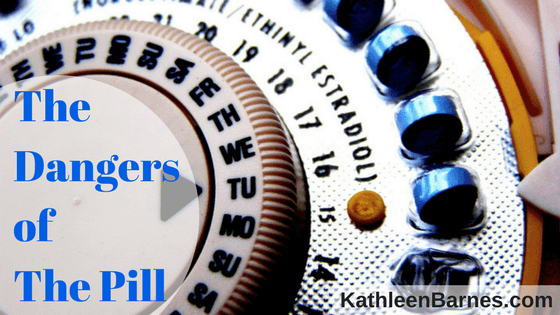Kathleen’s article on the dangers of birth control pills was originally published in Natural Awakenings Magazine.
For more than 50 years, women have loved the freedom that birth control pills offer. What’s not to love? Take a little pill every day and (pretty much) rest assured that an unplanned pregnancy won’t happen.
Well, it turns out there is quite a bit not to love about The Pill, and especially about its long-term effects.
“The sexual freedom that women have fought so hard to obtain has been won at a terrible price,” says Sherill Sellman, N.D., author of The Hormone Heresy: What Women MUST Know about Their Hormones.
That price includes blood clots and even death from heart attacks and strokes in young women. In fact, as early as 1963, an article published in the Journal of the American Medical Association linked The Pill to venous thrombosis or blood clots. At least one cancer journal, CA: A Cancer Journal for Clinicians, had linked cancer to the use of steroid hormones contained in oral contraceptives by 1968. By 1973, Scandinavian researchers warned of the link between oral contraceptives and strokes.
“In December 2002, the US government published its biannual Report on carcinogens that added all steroidal estrogens to the list of “known” human carcinogens,” says Sellman. “The gravity of this finding cannot be overstated: All estrogens used in HRT (hormone replacement therapy) and oral contraceptives have now been proven, unequivocally, to cause cancer!”
Still, The Pill is the most common method of birth control worldwide, according to the Centers for Disease Control and Prevention (CDC), with 16 percent of married American women saying they use The Pill and 29 percent of British women and 40 percent of women in France and the Netherlands.
Vitamin robbers
“Birth control pills are vitamin robbers and this is the source of the health risks that accompany the use of The Pill,” says Ross Pelton, RPh, author of The Pill Problem.
Oral contraceptives deplete more nutrients in the human body than any other class of drugs, says Pelton, who blogs regularly at TheNaturalPharmacist.net. However, he adds, women taking The Pill even as long as ten years may not notice any obvious health problems.
“Maybe first she’ll notice a lack of energy, but she doesn’t connect the dots and realize that depletion of magnesium, B12 and numerous other nutrients involved in energy production are depleted,” he explains.
The nutrient-depleting effects of The Pill were recognized as early as a study published in 1975 in the American Journal of Clinical Nutrition, but there were no recommendations about replacing those nutrients.
Some of these nutrients are essential for the production of brain chemicals called neurotransmitters, including mood-elevating dopamine. This leaves a woman open to depression, a condition closely linked to the use of The Pill, according to a German study published in 2013 in the journal General Hospital Psychiatry.
These steroidal hormones also deplete the body’s natural stores of disease preventing antioxidants, making a woman more vulnerable to diseases of aging, including cancer, diabetes and heart disease.
Women who decide to keep taking The Pill should add an array of supplements to counterbalance the nutrient depletion, Pelton says.
Replacing lost nutrients should, in the long term, neutralize the negative effects of The Pill, even cancer and blood clots, says Pelton.
Better yet, say Sellman and Pelton, stop taking The Pill and switch to safer forms of contraception. However, Pelton warns, it may take months or even years for the nutrient imbalances to be corrected.
So what to do?
There are no natural forms of estrogen used for birth control, but there are safe and effective natural forms of birth control, says West Hollywood, CA women’s health expert Holly Lucille, N.D., R.N.
There are still risks with estrogen patches, shots and vaginal rings, warns Lucille, so she recommends avoiding anything that contains estrogen.
“Not using The Pill doesn’t mean you have to rely on withdrawal or the rhythm method, both of which are notoriously unreliable,” says Lucille.
She prefers what she calls “barrier methods,” like diaphragms, cervical caps and male and female condoms.
“Cervical caps are just as effective as the pill and you can put them in and leave them a little longer for a bit more spontaneity,” she explains.
Female condoms, are even more convenient, she explains: “They fit much like a diaphragm and they can be left in place as long as eight hours.”
Instead of potentially toxic spermicides, Lucille recommends using lemon juice: “It’s just as effective.”
Nutrients to be supplemented for women on The Pill
- Folic acid
- Vitamin B2
- Vitamin B6
- Vitamin B12
- Magnesium
- Coenzyme Q10
- Selenium
- Vitamin C
- L-methlyfolate
- Zinc
- Tyrosine
- Melatonin
- Probiotics
- DHEA
- Natural progesterone
- Nettle root
- Chrysin
- Omega-3 fish oils
- Bioidentical hormone replacement for perimenopausal and menopausal women
–Source Ross Pelton, The NaturalPharmacist.net
Documented side effects of birth control pills
- Fatigue, low-energy and anemia
- Blood clots
- Birth defects
- Cardiovascular disease
- High blood pressure
- Heart attack
- Stroke
- Cancer (breast, uterine and colon)
- Osteoporosis
- Weakened immune system
- Depression
- Sleep disorders
- Vaginal yeast infections
- Migraine
- Fluid retention and weight gain
- Decreased desire for sex







